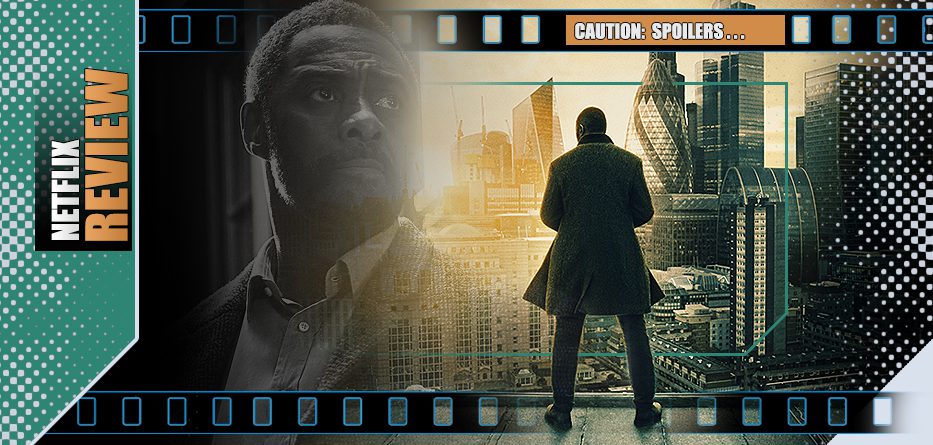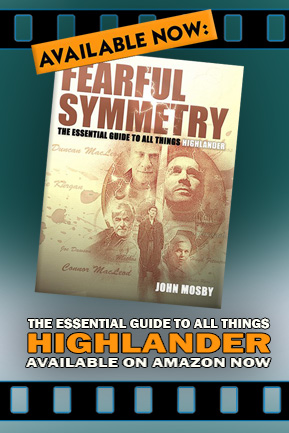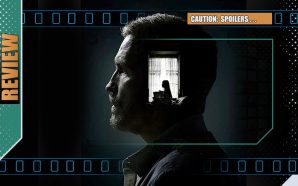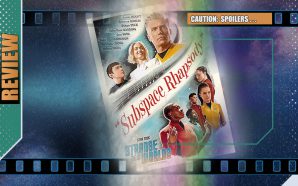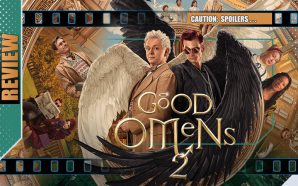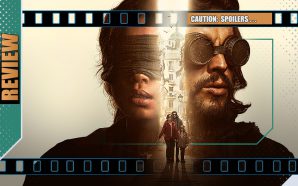John Luther might be one of the most intuitive detectives working in London, but it doesn’t mean he hasn’t cut a few corners, made a few enemies and generally walked a little either side of the ‘thin blue line’. When a damning file, exposing his less proud moments makes it way to the authorities, Luther finds himself in court then in jail, serving his sentence and surrounded by a lot of people wanting payback.
But on the outside, David Robey, the person who sent that file, relishes that Luther has been removed from play and goes about organising an audacious series of events designed to show just how far he can reach without ever being caught. Luther, taunted by Robey, knows that lives are once again on the line and decides that whatever the personal consequences, he must find a way out of prison and on to the killer’s trail.
But now he has Robey and the police searching for him, both entities willing to pull the trigger if he gets in the way. The puppet-master has vast resources at his finger-tips and the ability to coerce and influence the investigation, is there anything that can stop Robey’s sadistic scheme and anything Luther won’t sacrifice to make that happen?
*spoilers*
In preparation for the new Luther, I went back and watched all the previous runs from its primetime BBC era that ran, somewhat erratically between 2010 and 2019 (realising that I’d somehow entirely missed the fifth season) and once again threw myself into a world of sadistic serial-killers, compromised coppers and enigmatic ethics. This was a show that thrived in the dark and shadowy corners of the capital, both in a metaphorical and literal sense. A cross between classic Cracker and the US show The Shield, show-runner and writer Neil Cross – and, of course, leading man Idris Elba – gave us a flawed character who was your worst enemy but also his own. Metaphorically, he was Sherlock on speed, Columbo on crack, a Marylebone Marlowe all rolled into one crumpled but testosterone’d anti-hero.
John Luther was the kind of police detective that never met a corner he couldn’t cut in the pursuit of actual justice, existing by a singular and adaptive honour code that he believed in but which often found him trapped in a compromised moral maze of his own making. Tragedy followed him like the ghost of John Wick’s dog and over the years he lost friends, family and colleagues as the collateral damage of crossing the thin blue line. The crimes being investigated were of the nasty variety, the kind that, hopefully, are more the work of tv dramas than actual policing.
Rumours of a feature-film rumbled on for years, but it always seemed like something of a pipe-dream and some fans would be quite happy to simply see Luther continue in a series format. But four years after the last season, here it is – enjoying a brief run at some US cinemas, for around a week’s limited engagement then straight on to its main Netflix debut.
The problem with Luther: The Fallen Sun is a familiar one for tv-to-feature upgrades: that just because it’s able to be bigger, wider, longer, louder and shinier, it doesn’t necessarily make it better… A show that might have been darker and larger than life now becomes larger than logic, going for set-pieces that certainly blow the budget but look like the kind of widescreen decoration and punctuation the original didn’t need to work. …
The problem with Luther: The Fallen Sun is a familiar one for tv-to-feature upgrades: that just because it’s able to be bigger, wider, longer, louder and shinier, it doesn’t necessarily make it better. It might work if you were seeing it as a wholly cinema-driven reboot, but its Netflix platform (from 10th March) means it’s delivered to the faithful and the new viwer in an almost identical way to its predecessors, so the flourishes and embellishments stand out as such. Less a feature film more a sweeps-ep on steroids. A show that might have been darker and larger than life now becomes larger than logic, going for set-pieces that certainly blow the budget but look like the kind of widescreen decoration and punctuation the original didn’t need to work. In fact, the longer that this Netflix special goes on, the less like Luther it becomes. Car-chases literally spinning across Piccadilly Circus (with admittedly impressive but not wholly seamless CGI) cackling super-villains with infinite finances and dodgy hair-pieces and literal ice palaces impossibly housed inside Norwegian glaciers… suddenly this is an inner-city James Bond audition writ large and however interesting Elba would undeniably be as 007 – a role for which he was recently a favourite but for which he’s also apparently ruled himself out – those elements feel wholly at odds with its roots.
The pacing and editing of the story somewhat hobbles proceedings. The Fallen Sun – and, as far as I can tell, this seems to be a random refrigerator magnet lexicon of a title – ignores several of the specifics of the fifth season (and that series finale) and yet spends its first act then recreating almost the same dilemma of Luther being sent to prison for his past misdemeanours involving high crimes. What might have worked had the film started with him already behind bars – and then suggesting Andy Serkis’ character was involved in some previously unseen capacity – might have given us momentum, but here we have throwaway hand-waving reasons presented and a halfway house of a sequence that suggests there’s a connective-tissue throughline to the fifth season but then veers away unwilling to fully commit. When all’s done with being introduced, Luther is then off to get beaten up in prison only so we can see him quickly escape.
If Luther‘s world has always been casually brutal, the level of overt sadism rises here, though it’s often presented with an eye to the camerawork and the stylistic stylus of post-production. Neon, fire, vistas of cityscapes, wide open spaces and blood-splattered walls have rarely appeared in such crystal-clear form and one can debate that as a standard to applaud or not. There’s no denying that there is a decent thriller in the midst of all the money and chaos – the idea that someone could harness social media and our reliability on electronics while running riot by blackmailing people because of their dark secrets (or even mere foibles) is begging for a better showcase. Equally, the concept of a network of paedophiles and voyeuristic acolytes acting as an audience for the carnage is uncomfortably believable in concept if not execution. The Picadilly Circus scenes, even stripped of VFX would be chilling given the suicidal aspects and London’s skyline is a character in its own right. It’s just a sense of priorities that leads us astray, pretty though this is in a savage way, it’s all fur coat and no ‘nickers when it comes to dazzling us rather than making us care.
Elba, ever the charismatic anti-hero, is more than capable of being a winner on the charm offensive and the physical needs of his character. One minute Luther is kicking serious bottom and the next he’s like a battered hound with a hangdog attitude – that much remains intact. It’s just everything else that has been imported and transplanted in around him. The subsequent prison riot is brutal and very nicely put together (if , again, slightly choreographed to the point of being more stylised to the bare-knuckle feel of the original) and once he’s battled through the cell-block and out again, Elba still rocks the coat, shirt and tie ensemble that are as much his default superhero uniform as they are a fashion statement.
Villains maketh the hero and Luther’s rogues’ gallery has always existed in a heightened, bloodsplatted reality, rendered unlikely only by their specific quirks. Alice Morgan, a seductive sociopath, played with relish by Ruth Wilson, was one of the cornerstones of the series – both an ally and adversary who helped and hindered Luther in equal measure. Having been written out via an off-screen death twice (the rule of, if you don’t see the body, be skeptical says Neil Cross), her whimsical and sardonic scorpion-like flourishes are sorely missed ever since and there’s nary a wisp of her here. Instead, multi-talented performer Andy Serkis – an actor of regard, the king of motion-capture and a rising director of note – assumes the major threat. Disappointingly, his ‘David Robey’ is little more than a paper-thin caricature, a cackling toxic imp that’s chewing the scenery throughout, a raving psychopathic sadist with Blofeld resources and so much of a grand-guignol pantomime dame that you feel like yelling ‘He’s behind yooooou!‘ every time he tip-toes onto screen.
Luther was always something of a guilty pleasure and designed to make you smile and wince in equal measure as the titular detective made good deductions and bad decisions, unlikely though either might sometimes feel. But The Fallen Sunthough it’s a diverting-enough two hours, only pays lip-service to the series’ strengths in passing, making the big much bigger but the chilling less thrilling and the foibles more forced. It seems a change wasn’t as good as arrest.
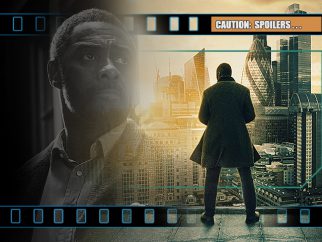
- Story7
- Acting8
- Direction9
- Production Design / VFX8

